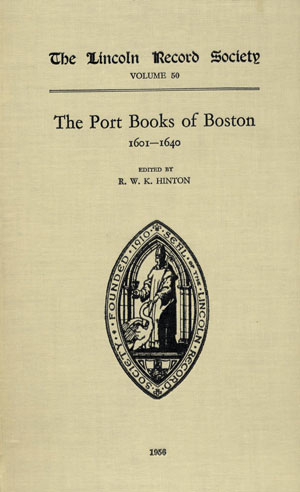
The Boston Port Books make available in a clear and useful fashion the materials for a study of foreign trade of Boston in the first half of the 17th century. At one time the port of Boston was second in importance only to London, but by the 17th century its trade was much smaller than Hull’s. The great inland area once served by Boston had come to depend on the rivers of Humber and Thames, and Boston now exported mainly the produce of a limited hinterland, and imported goods apparently for local consumption. These port books, displaying what is indeed a negligible proportion of the total trade of the United Kingdom, are therefore a contribution to the economic study of Lincolnshire. This does not necessarily mean that they are only of local value. If the merchants of Boston in their relatively small trade were subject to the same influences as the merchants of greater ports, to study the trade of Boston is in some sort to study a national trade in miniature.
Adapted from the Preface.
Adapted from the Preface.

Volume 50 The Port Books of Boston 1601 – 1640
Editor R.W.K. Hinton Fellow of Peterhouse, Cambridge
Date For the years ending 31st August, 1954 and 31st August, 1955
Publication Date 1956
Size 255 x 155 mm
Language English
Printer The Hereford Times Limited, Hereford
Content Frontispiece, facsimile of Entries from the collectors’ book for Michaelmas 1602 to Easter 1603
Preface, 2 pages
Contents, 1 page
Abbreviations, Etc., used in the text, 2 pages
List of Port Books, 1 page
Introduction, 31 pages
Appendix A A comparison of Boston Port Books and the Danish Sound Toll Registers, 8 pages
Appendix B Some figures of tonnage and poundage in selected years, 2 pages
The Port Books, 321 pages
Index of Persons, 6 pages
Index of Places, 3 pages
Index of Subjects, 5 pages
Description The Boston Port Books make available in a clear and useful fashion the materials for a study of foreign trade of Boston in the first half of the 17th century. At one time the port of Boston was second in importance only to London, but by the 17th century its trade was much smaller than Hull’s. The great inland area once served by Boston had come to depend on the rivers of Humber and Thames, and Boston now exported mainly the produce of a limited hinterland, and imported goods apparently for local consumption. These port books, displaying what is indeed a negligible proportion of the total trade of the United Kingdom, are therefore a contribution to the economic study of Lincolnshire. This does not necessarily mean that they are only of local value. If the merchants of Boston in their relatively small trade were subject to the same influences as the merchants of greater ports, to study the trade of Boston is in some sort to study a national trade in miniature.
Adapted from the Preface.
Editor R.W.K. Hinton Fellow of Peterhouse, Cambridge
Date For the years ending 31st August, 1954 and 31st August, 1955
Publication Date 1956
Size 255 x 155 mm
Language English
Printer The Hereford Times Limited, Hereford
Content Frontispiece, facsimile of Entries from the collectors’ book for Michaelmas 1602 to Easter 1603
Preface, 2 pages
Contents, 1 page
Abbreviations, Etc., used in the text, 2 pages
List of Port Books, 1 page
Introduction, 31 pages
Appendix A A comparison of Boston Port Books and the Danish Sound Toll Registers, 8 pages
Appendix B Some figures of tonnage and poundage in selected years, 2 pages
The Port Books, 321 pages
Index of Persons, 6 pages
Index of Places, 3 pages
Index of Subjects, 5 pages
Description The Boston Port Books make available in a clear and useful fashion the materials for a study of foreign trade of Boston in the first half of the 17th century. At one time the port of Boston was second in importance only to London, but by the 17th century its trade was much smaller than Hull’s. The great inland area once served by Boston had come to depend on the rivers of Humber and Thames, and Boston now exported mainly the produce of a limited hinterland, and imported goods apparently for local consumption. These port books, displaying what is indeed a negligible proportion of the total trade of the United Kingdom, are therefore a contribution to the economic study of Lincolnshire. This does not necessarily mean that they are only of local value. If the merchants of Boston in their relatively small trade were subject to the same influences as the merchants of greater ports, to study the trade of Boston is in some sort to study a national trade in miniature.
Adapted from the Preface.